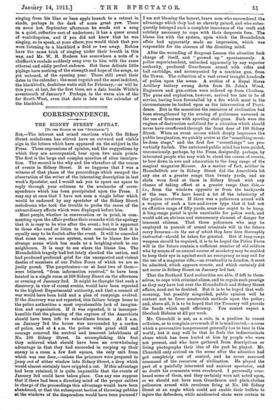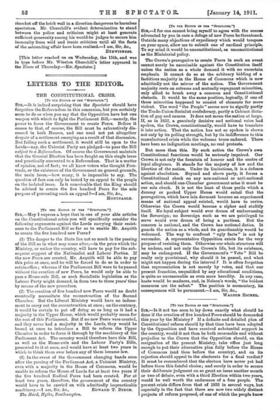CORRESPONDENCE.
THE SIDNEY STREET AFFRAY.
[To THY EDITOli OF TICE ggsrizcyrcoa.-1 SIR, —The interest and mixed emotions which the Sidney Street melodrama has stirred have an outward and visible sign in the letters which have appeared on the subject in the Press. These expressions of opinion, and the suggestions by which they are accompanied, bear upon two main points. The first is the large and complex question of alien immigra- tion. The second is the why and the wherefore of the course of events in Sidney Street. It so happens that I was a witness of that phase of the proceedings which escaped the observation of the writer of the interesting description in last week's Spectator, and I would ask you to spare me space to reply through your columns to the avalanche of corre- spondence which has been precipitated upon the Press. I may say at once that I have not seen a single letter which would be endorsed by any spectator of the Sidney Street melodrama who took the trouble to probe the cause of the extraordinary effects which were displayed before him.
Most people, whether in conversation or in print, in com- menting upon the affair preface their remarks with the apology that it is easy to be wise after the event ; but it is apparent to those who read or listen to their conclusions that it is equally easy to be foolish after the event. It will be conceded that some one, or some system, must be to blame for the strange scene which has made us a laughing-stock to our neighbours. It is easy to see where the blame lies. The Houndsditch tragedy had but lately shocked the nation, and had produced profound grief for the unexpected and violent deaths of members of our Police Force of which we are so justly proud. The perpetrators—or at least two of them— were believed, "from information received," to have been located in a single room at 100 Sidney Street on the afternoon or evening of January 2nd. It might be thought that such a discovery, in view of recent events, would have been reported to the highest Departmental authority, and that a council of war would have been held and a plan of campaign evolved. If the discovery was not reported, this failure brings home to the police authorities a most reprehensible lack of imagina- tion and organisation. If it was reported, it is incompre- hensible that the planning of the capture of the Anarchists should have been left to subordinate brains. At 2 a.m. on January 3rd the house was surrounded by a cordon of police, and at 4 a.m. the police with great skill and courage removed the neutral and innocent inhabitants of No. 100 Sidney Street. In accomplishing this feat they achieved what should have been an overwhelming advantage in that they had succeeded in cooping up their enemy in a room a, few feet square, the only exit from which was one door,—unless the prisoners were prepared to jump out of either window into Sidney Street, a drop which would almost certainly have crippled a cat. If this advantage had been retained, it is quite impossible that the events of January 3rd could have taken place. Can any one suppose that if there had been a directing mind of the proper calibre in charge of the proceedings this advantage would have been abandoned, or that the subsequent tactics of throwing pebbles at the windows of the desperadoes would have been pursued?
I am not blaming the honest, brave men who surrendered the advantage which they had so cleverly gained, and who subse- quently betrayed such a complete innocence of the craft and subtlety necessary to cope with their desperate foes. The blame lies with the system, upon which the Houndeditch affair had apparently made no impression, which was responsible for the absence of the directing mind.
After the wounding of Sergeant Leeson the situation took charge of itself, and " growed up " spontaneously. A. police superintendent, unbacked apparently by any superior authority, produced Guardsmen armed with rifles and ball cartridge, and accompanied by a machine gun, from the Tower. The collection of a vast crowd brought hundreds of police upon the scene. A section of a Royal Horse Artillery battery swung down from St. John's Wood. Engineers and gun-cotton were ordered up from Chatham. The guns and explosives, however, arrived too late to be of service, having been forestalled by a fire which must in the circumstances be looked upon as the intervention of Provi- dence. But in the meantime the resources of civilisation had been strengthened by the arming of policemen unversed in the use of firearms with sporting shot-guns. Such were the engines of destruction mobilised for a situation which should never have overflowed through the front door of 100 Sidney Street. When an event occurs which deeply impresses the public imagination, we quickly arrive at the "something-must- be-done stage," and the first few " somethings " are pro- verbially foolish. The untutored public mind has been guided, unconsciously, perhaps, by the Press, designedly, perhaps, by interested people who may wish to cloud the course of events, to bow down in awe and admiration to the long range of the magical magazine Mauser. As a matter of fact, neither in Houndsditch nor in Sidney Street did the Anarchists hit any one at a greater range than twenty yards, and no shots were fired at them in Sidney Street with any chance of taking effect at a greater range than this,— i.e., from the windows opposite or from the backyards at the rear. We have heard a lot of the inferiority of the police revolvers. If there was a policeman armed with a weapon of such a bow-and-arrow type that it had not an effective range of fifty yards, some one ought to be hung. A long-range pistol is quite unsuitable for police work, and would add an obvious and unnecessary element of danger for innocent citizens. That those policemen who may be employed in pursuit of armed criminals will in the future carry firearms—in the use of which they have been thoroughly instructed—should be taken for granted. But if long-range weapons should be required, it is to be hoped the Police Force will in the future contain a sufficient number of old soldiers who by means of an annual course of musketry may be enabled to keep their eye in against such an emergency as may call for the use of a magazine rifle,—an eventuality in London, it must be admitted, which appears remote, and which certainly did not occur in Sidney Street on January 3rd last.
That the Scotland Yard authorities are able, if left to them- selves, to cope with criminal aliens, and to regain such prestige as they may have lost over the Houndsditch and Sidney Street affairs, need not be doubted. But it is to be hoped that well- meaning, but possibly misguided, public opinion will be content not to force amateurish methods upon the police ; and, above all, it is to be hoped that the Treasury will provide the funds which spell efficiency. You cannot expect a Sherlock Holmes at £2 per week.
Mr. Churchill is not, as a rule, in a position to resent criticism, or to complain overmuch if it is misdirected,—a cross which a provocative temperament generally has to bear in this world.; but it may well be that he feels the indiscriminate abuse which has been hurled at him by people who were not present, and who have gathered from descriptions or living photographs their idea of the part be played. Mr. Churchill only arrived on the scene after the situation had got completely out of control, and he never assumed command of the resources of civilisation. He played the part of a painfully interested and anxious spectator, and no doubt his comments were overheard. I personally over- heard some of them, and they certainly were not acted upon, or we should not have seen Guardsmen and plain-clothes policemen armed with revolvers firing at No. 100 Sidney Street at an angle which could not enable their bullets to injure the defenders, while misdirected shots were certain to ricochet off the brick wall in a direction dangerous to harmless spectators. Mr. Churchill's evident determination to stand between the police and criticism might at least generate sufficient generosity among his would-be judges to secure him immunity from wild and ironic criticism until all the facts of the astounding affair have been realised.—I am, Sir, &o., ErEwiniE es.
[This letter reached us on Wednesday, the 11th, and was in type before Mr. Winston Churchill's letter appeared in the Times of Thursday.—En. Spectator.]







































 Previous page
Previous page